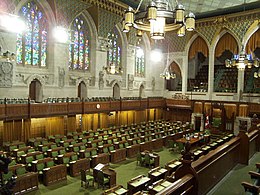House of Commons of Canada
|
House of Commons of Canada Chambre des communes du Canada |
|
|---|---|
| 42nd Parliament | |
 |
|
| Type | |
| Type |
Lower House of the Parliament of Canada
|
| Leadership | |
| Structure | |
| Seats | 338 |
 |
|
|
Political groups
|
HM Government (182)
Other Parties (56)
Vacant (3)
|
| Salary | $170,400 sessional indemnity effective 1 April 2016) |
| Elections | |
| First-past-the-post | |
|
Last election
|
19 October 2015 |
|
Next election
|
21 October 2019 |
| Meeting place | |
 |
|
|
Centre Block – Parliament Hill Ottawa |
|
| Website | |
| www |
|
HM Government (182)
Other Parties (56)
Vacant (3)
The House of Commons of Canada (French: Chambre des communes du Canada) is a component of the Parliament of Canada, along with the Sovereign (represented by the Governor General) and the Senate. The House of Commons chamber is located in the Centre Block of the Parliament Buildings on Parliament Hill in Ottawa.
The House of Commons is a democratically elected body whose members are known as Members of Parliament (MPs). There were 308 members in the last Parliament (most members elected in 2011), but that number has risen to 338 following the election on Monday October 19, 2015. Members are elected by simple plurality ('first-past-the-post' system) in each of the country's electoral districts, which are colloquially known as ridings. MPs may hold office until Parliament is dissolved and serve for constitutionally limited terms of up to five years after an election. Historically however, terms have ended before their expiry and the sitting government has typically dissolved parliament within four years of an election according to a long-standing convention. In any case, an Act of Parliament now limits each term to four years. Seats in the House of Commons are distributed roughly in proportion to the population of each province and territory. However, some ridings are more populous than others, and the Canadian constitution contains some special provisions regarding provincial representation. As a result, there is some interprovincial and regional malapportionment relative to population.
...
Wikipedia
